英语:Unit2《What is happiness to you?》课件(译林牛津版选修6)
文档属性
| 名称 | 英语:Unit2《What is happiness to you?》课件(译林牛津版选修6) |

|
|
| 格式 | zip | ||
| 文件大小 | 1.2MB | ||
| 资源类型 | 教案 | ||
| 版本资源 | 牛津译林版 | ||
| 科目 | 英语 | ||
| 更新时间 | 2012-04-10 00:00:00 | ||
图片预览


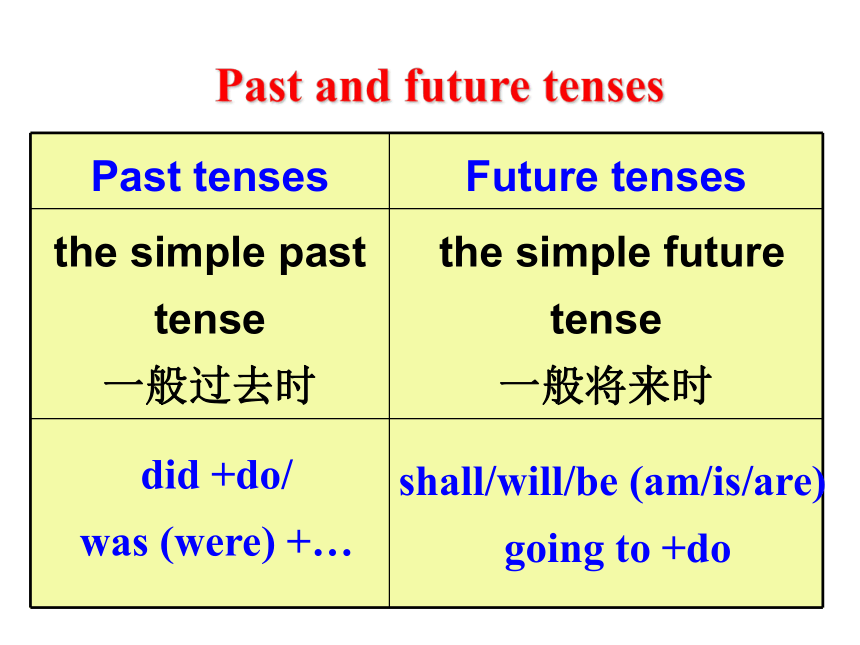
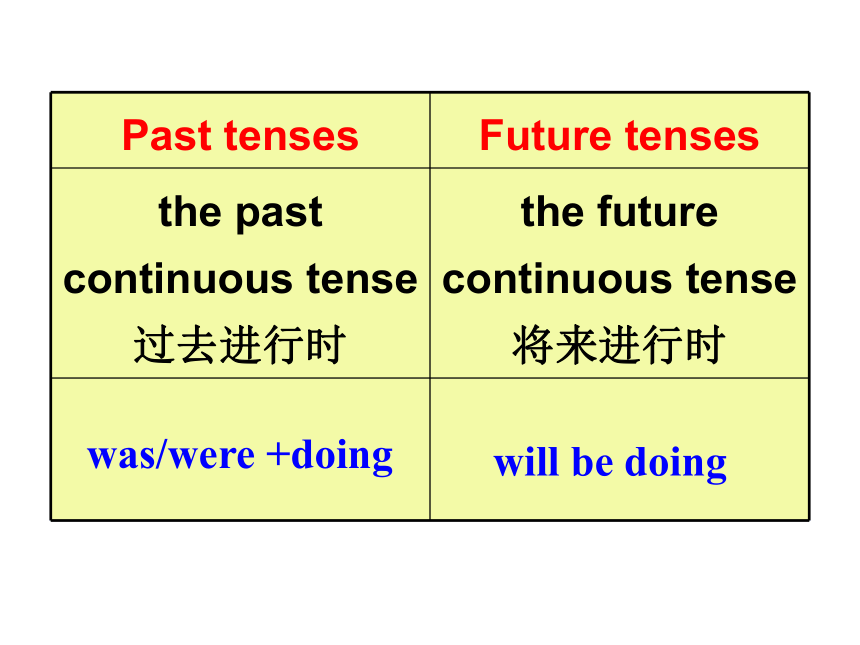
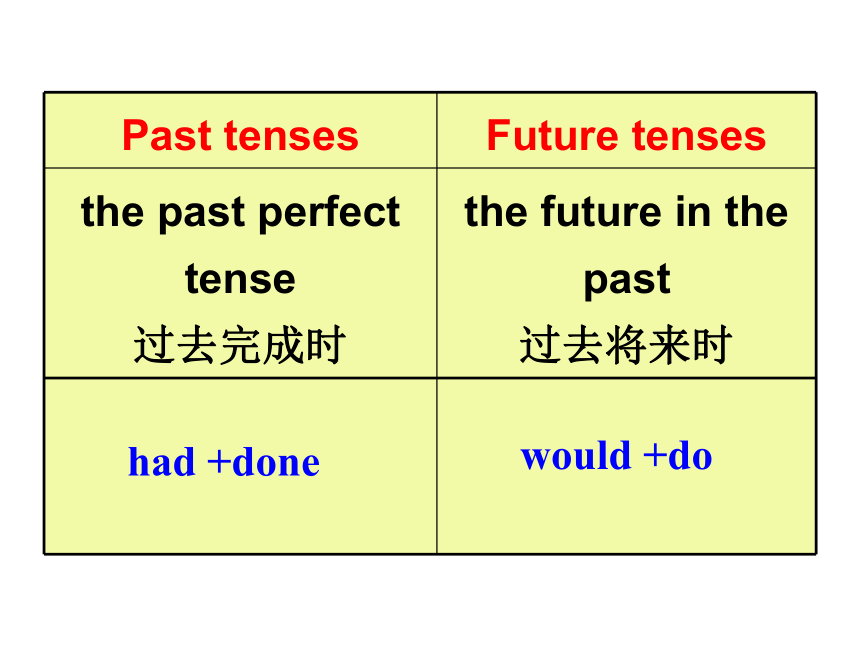
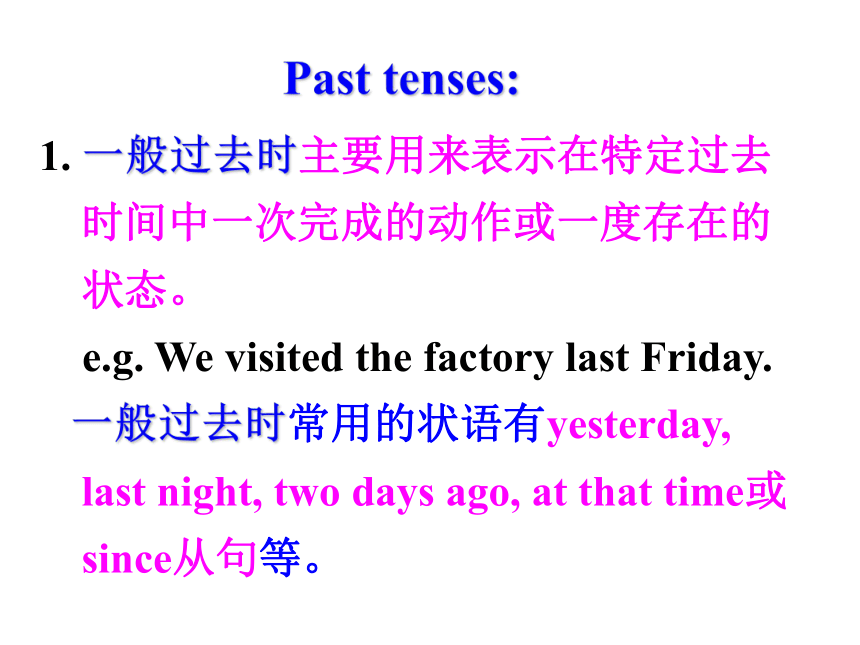
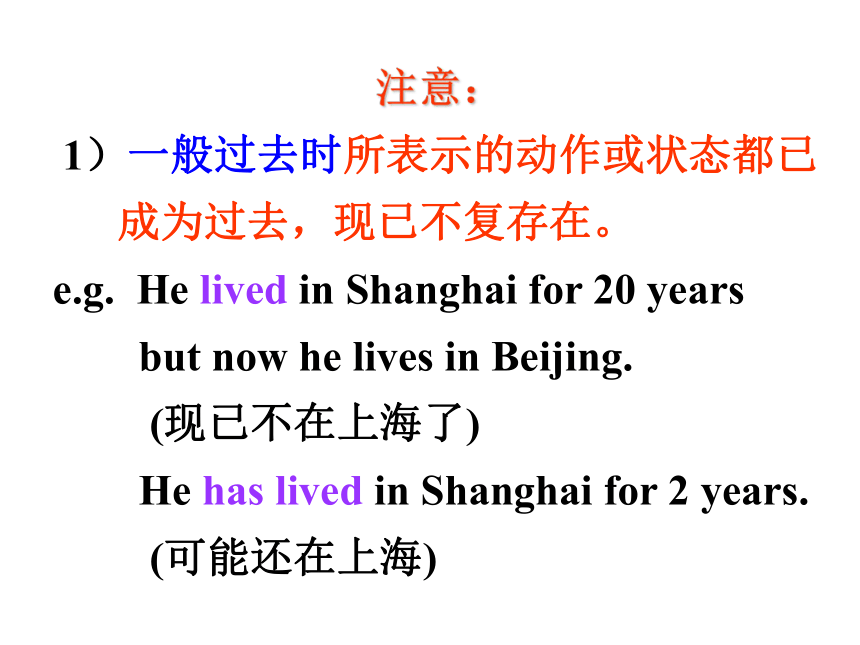


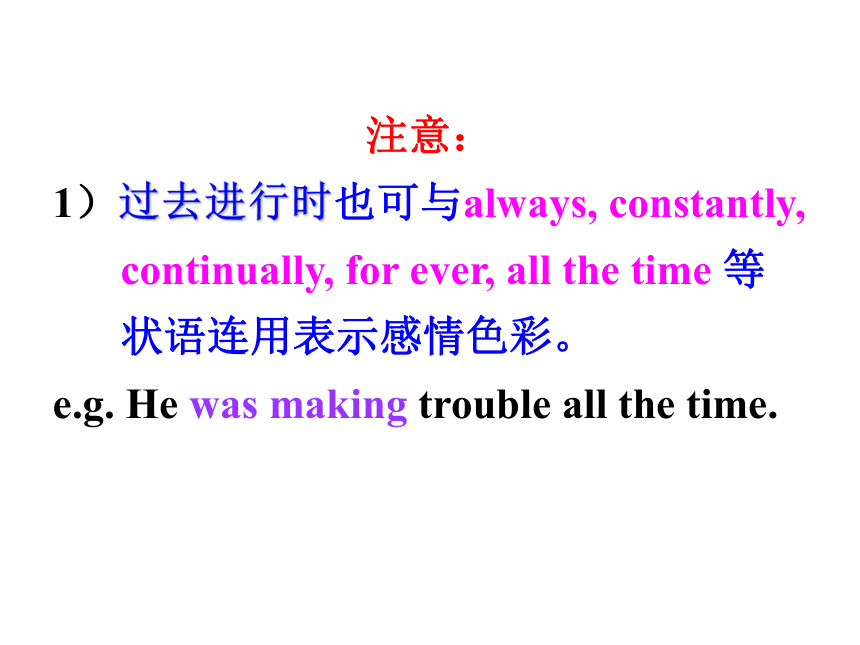
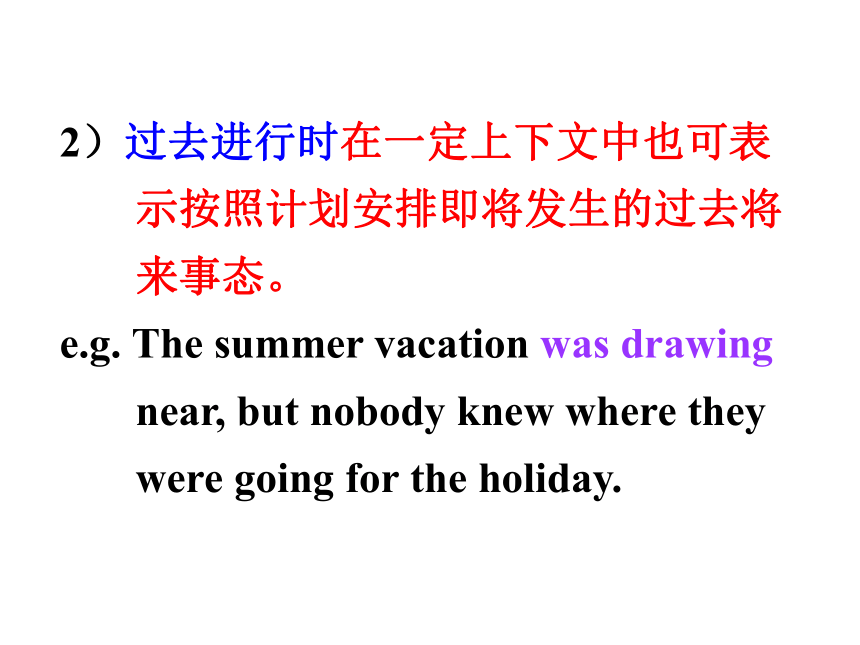
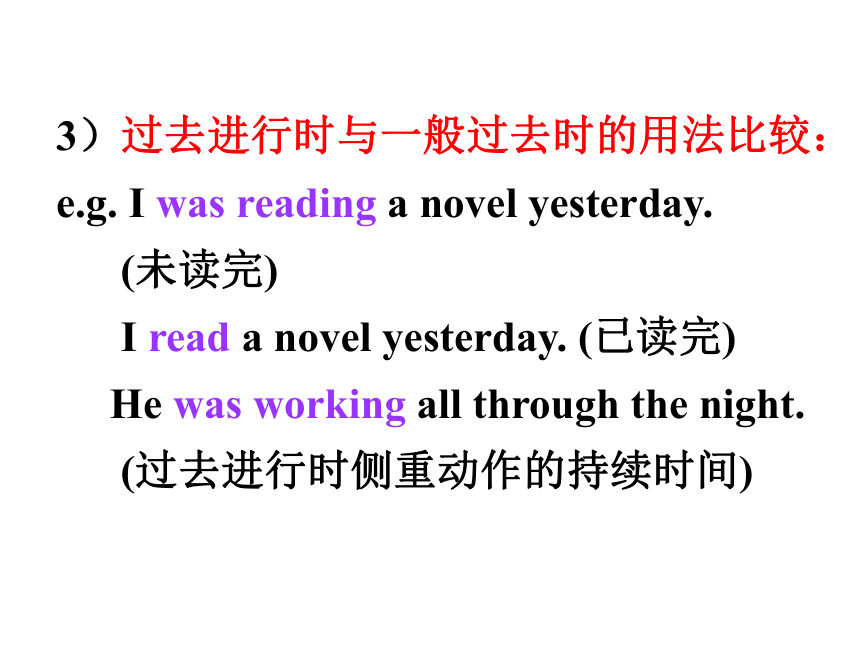
文档简介
(共49张PPT)
牛津版
高二 模块六
Unit 2
Unit 2 What is happiness to you
Grammar and Usage
Past tenses Future tenses
the simple past tense 一般过去时 the simple future tense 一般将来时
Past and future tenses
did +do/
was (were) +…
shall/will/be (am/is/are)
going to +do
Past tenses Future tenses
the past continuous tense
过去进行时 the future continuous tense
将来进行时
was/were +doing
will be doing
Past tenses Future tenses
the past perfect tense
过去完成时 the future in the past 过去将来时
had +done
would +do
1. 一般过去时主要用来表示在特定过去时间中一次完成的动作或一度存在的状态。
e.g. We visited the factory last Friday.
一般过去时常用的状语有yesterday, last night, two days ago, at that time或since从句等。
Past tenses:
注意:
1)一般过去时所表示的动作或状态都已
成为过去,现已不复存在。
e.g. He lived in Shanghai for 20 years
but now he lives in Beijing.
(现已不在上海了)
He has lived in Shanghai for 2 years.
(可能还在上海)
2)一般过去时还可用于虚拟语气中的非真实的动作或状态,常用于特定句型中表示现在和将来时间。
e.g. It’s time you had a holiday.
I wish you lived closer to us.
If only he didn’t drive so fast!
If I had the money, I’d buy a car.
----Can I smoke here
----I’d rather you didn’t.
2. 过去进行时主要表示过去某时正进
行的动作。
e.g. What were you doing yesterday at
seven p.m.
注意:
1)过去进行时也可与always, constantly, continually, for ever, all the time 等状语连用表示感彩。
e.g. He was making trouble all the time.
2)过去进行时在一定上下文中也可表示按照计划安排即将发生的过去将来事态。
e.g. The summer vacation was drawing near, but nobody knew where they were going for the holiday.
3)过去进行时与一般过去时的用法比较:
e.g. I was reading a novel yesterday.
(未读完)
I read a novel yesterday. (已读完)
He was working all through the night.
(过去进行时侧重动作的持续时间)
3. 过去完成时主要用于表示:
1)完成用法:过去某一时刻或某一
事件前完成的动作或状态。
e.g. I had written the article when they came.
2)未完成用法:过去某一时刻或某一事件前已经开始,一直延续到这一过去时间,而且到那时还未结束,仍有继续下去的可能性。
e.g. By December last year, he had worked in Beijing for five years.
1. 一般将来时主要用于表示某个时刻或某段时间内将要发生的动作或状态, 更多的用于带有条件分句的主句中。
e.g. He will come back next week.
I’ll ask her as soon as she comes.
Future tenses
注意
1)在主句中用一般现在时表示一般将来时的用法:在表示车、船、飞机等按照固定的时刻表进出站、港时,尤其是特别描述某一车次、轮次和航班的进出时间时,可用此用法,句中的谓语动词常为 leave, start, go等。
e.g. The next train leaves at seven o’clock.
2)在从句中用一般现在时表示一般将来时的用法:在以after, when, while, as, before, once, as soon as, if, unless 等引导的状语从句中多用此用法。
e.g. I’ll call you back as soon as I arrive
in Paris.
2. 将来进行时
1)用于表示将来某一时刻或时段里正在进行的动作。
e.g. What will you be doing this time
tomorrow morning
2)这种结构通常带有“自然要发生”的含义。
e.g. You can use my bike. I won’t be
needing it tomorrow.
3. 过去将来时通常带有表示过去将来
的时间状语,多用于从属分句中。
e.g. He said he would come back the
next day.
高考链接
1. Sang Lan was born in Ningbo, China in
1981. (P24)
[考点] 一般过去时
[考例1] The flowers were so lovely that
they _____ in no time. (2007全国卷I)
A. sold B. had been sold
C. were sold D. would sell
[点拨] 选C。sell和flowers 是逻辑上的动宾关系,所以应用被动语态,故排除A、D两项。结果状语从句中的谓语动词和主句中的谓语动词不存在时间上的先后顺序,所以排除B选项。
[考例2] I know a little bit about Italy as my wife and I _____ there several years ago. (2007全国卷I)
A. are going B. had been
C. went D. have been
[点拨] 选C。由具体的时间状语several years ago可知用一般过去时。
2. She knew that in those years she was
making her parents proud. (P24)
[考点] 过去进行时
[考例1] —Is there anything wrong, Bob
You look sad.
—Oh, nothing much. In fact, I ______ of
my friends back home. (2007全国卷II)
A. have just thought B. was just thinking
C. would just think D. will just be thinking
[点拨] 选B。根据语境:刚才一直在想家里的朋友,所以现在看起来很悲伤。
[考例2] —I saw Jane and her boyfriend in the park at eight yesterday evening.
—Impossible. She _____ TV with me in my home then. (福建2007)
A. watched B. had watched
C. would watch D. was watching
[点拨] 选D。此处时间状语为then,指的是at eight yesterday evening,指过去某个时刻正在进行的动作,故用过去进行时态。
3. Instead of crying about what she had
lost, Sang Lan thought about what
she could do to get better. (P24)
[考点] 过去完成时
[考例1] —Did Alan enjoy seeing his old friends yesterday
—Yes, he did. He _____ his old friends for
a long time. (重庆2007)
A. didn’t see B. wouldn’t see
C. hasn’t seen D. hadn’t seen
[点拨] 选D。从语境可以看出,所填空的状态开始于过去的过去,一直持续到过去某个动作,所以用过去完成时。
[考例2] At the end of the meeting, it was announced that an agreement _____.
(江苏2007)
has been reached B. had been reached
C. has reached D. had reached
[点拨] 选B。“协议达成”发生在was announced之前,故用过去完成时。
[考例3] They became friends again that day. Until then, they _____ to each other for nearly two years. (安徽2007)
A. didn’t speak B. hadn’t spoken
C. haven’t spoken D. haven’t been speaking
[点拨] 选 B。hadn’t spoken to each other发生在They became friends again之前,故用过去完成时。
4. Before she went to the Goodwill Games,
Sang Lan told her parents she was
going to win her event. (P24)
[考点] 过去将来时
[考例] —Tom, you didn’t come to the party last night
—I _____, but I suddenly remembered I had homework to do. (2007全国卷II)
A. had to B. didn’t
C. was going to D. wouldn’t
[点拨] 选C。was going to do sth.表示按计划或安排要做某事。根据but可知选C项。
Exercises
1. ----What were you doing when Tony
phoned you
---- I had just finished my work and _to take a shower. (2004天津)
A. had started B. started
C. have started D. was starting
2. ----You were out when I dropped in at
your house.
---- Oh, I _____ for a friend from England at the airport. (2004福建)
A. was waiting B. had waited
C. am waiting D. have waited
3. — George and Lucy got married last
week. Did you go to their wedding
— No, I __. Did they have a big wedding (2004湖北)
A. was not invited
B. hadn’t been invited
C. have not been invited
D. didn’t invite
4. All morning as she waited for the medical report from the doctor, her nervousness___. (NMET 2003)
A. has grown B. is growing
C. grew D. had grown
5. Tom was disappointed that most of the guests ___ when he ___at the party. (NMET 1989)
A. left,had arrived B. left, arrived
C. had left, had arrived
D. had left, arrived
6. The new secretary is supposed to report to the manager as soon as she____.
(MET1990)
A. will arrive B. arrives
C. is arriving D. is going to arrive
7.----We could have walked to the station, it was so near.
----Yes. A taxi ____ at all necessary.
(NMET1992)
A. wasn’t B. had been
C. wouldn’t be D. won’t be
8. At this time tomorrow ____ over the
Atlantic. (2003北京)
A. we’re going to fly
B. we’ll be flying
C. we’ll fly
D. we’re to fly
9. ---Have you finished your homework, Mary
---No. I ____ my mother in the kitchen all day yesterday.
A. was helping B. helped
C. have helped D. had helped
10. ----What were you doing when I phoned you last night
----I ____ my painting and was starting to take a bath.
A. have already finished
B. was finished
C. had just finished
D. was going to finish
11. This time Tom_____ careful enough, otherwise he would not have passed the test.
A. was B. should be
C. had been D. were
12. Tom said he ____ to her, but he ____ yet.
A. will write, didn’t
B. has written, hasn’t
C. was going to, write, wasn’t
D. would write, hasn’t
13.--- Why Where is the key to the
meeting room
--- Dear me! You ____ it in the taxi!
A. had never left
B. didn’t leave
C. never left
D. haven’t left
14. It is the second time that I ___ in
Shanghai. What great changes have taken place in Shanghai! It is ten years since I ____ it last time.
A. have been, left
B. had been, left
C. have been, had left
D. went, had left
Para 1: falls-fell, breaks- broke
Para 2: loves-loved, has-had, is- was,
has-had, had got-got
Para 3: has-had ,is-was, was-am
says-said, tries- was trying
Para 4: was -is
Answers to Exercise A:
Exercise B:
1. is going to have
2. will/ shall, enjoy
3. was thinking
4. had finished
5. had, begun
6. was
Homework
Finish Parts C1 and C2 on page 110
in workbook.
牛津版
高二 模块六
Unit 2
Unit 2 What is happiness to you
Grammar and Usage
Past tenses Future tenses
the simple past tense 一般过去时 the simple future tense 一般将来时
Past and future tenses
did +do/
was (were) +…
shall/will/be (am/is/are)
going to +do
Past tenses Future tenses
the past continuous tense
过去进行时 the future continuous tense
将来进行时
was/were +doing
will be doing
Past tenses Future tenses
the past perfect tense
过去完成时 the future in the past 过去将来时
had +done
would +do
1. 一般过去时主要用来表示在特定过去时间中一次完成的动作或一度存在的状态。
e.g. We visited the factory last Friday.
一般过去时常用的状语有yesterday, last night, two days ago, at that time或since从句等。
Past tenses:
注意:
1)一般过去时所表示的动作或状态都已
成为过去,现已不复存在。
e.g. He lived in Shanghai for 20 years
but now he lives in Beijing.
(现已不在上海了)
He has lived in Shanghai for 2 years.
(可能还在上海)
2)一般过去时还可用于虚拟语气中的非真实的动作或状态,常用于特定句型中表示现在和将来时间。
e.g. It’s time you had a holiday.
I wish you lived closer to us.
If only he didn’t drive so fast!
If I had the money, I’d buy a car.
----Can I smoke here
----I’d rather you didn’t.
2. 过去进行时主要表示过去某时正进
行的动作。
e.g. What were you doing yesterday at
seven p.m.
注意:
1)过去进行时也可与always, constantly, continually, for ever, all the time 等状语连用表示感彩。
e.g. He was making trouble all the time.
2)过去进行时在一定上下文中也可表示按照计划安排即将发生的过去将来事态。
e.g. The summer vacation was drawing near, but nobody knew where they were going for the holiday.
3)过去进行时与一般过去时的用法比较:
e.g. I was reading a novel yesterday.
(未读完)
I read a novel yesterday. (已读完)
He was working all through the night.
(过去进行时侧重动作的持续时间)
3. 过去完成时主要用于表示:
1)完成用法:过去某一时刻或某一
事件前完成的动作或状态。
e.g. I had written the article when they came.
2)未完成用法:过去某一时刻或某一事件前已经开始,一直延续到这一过去时间,而且到那时还未结束,仍有继续下去的可能性。
e.g. By December last year, he had worked in Beijing for five years.
1. 一般将来时主要用于表示某个时刻或某段时间内将要发生的动作或状态, 更多的用于带有条件分句的主句中。
e.g. He will come back next week.
I’ll ask her as soon as she comes.
Future tenses
注意
1)在主句中用一般现在时表示一般将来时的用法:在表示车、船、飞机等按照固定的时刻表进出站、港时,尤其是特别描述某一车次、轮次和航班的进出时间时,可用此用法,句中的谓语动词常为 leave, start, go等。
e.g. The next train leaves at seven o’clock.
2)在从句中用一般现在时表示一般将来时的用法:在以after, when, while, as, before, once, as soon as, if, unless 等引导的状语从句中多用此用法。
e.g. I’ll call you back as soon as I arrive
in Paris.
2. 将来进行时
1)用于表示将来某一时刻或时段里正在进行的动作。
e.g. What will you be doing this time
tomorrow morning
2)这种结构通常带有“自然要发生”的含义。
e.g. You can use my bike. I won’t be
needing it tomorrow.
3. 过去将来时通常带有表示过去将来
的时间状语,多用于从属分句中。
e.g. He said he would come back the
next day.
高考链接
1. Sang Lan was born in Ningbo, China in
1981. (P24)
[考点] 一般过去时
[考例1] The flowers were so lovely that
they _____ in no time. (2007全国卷I)
A. sold B. had been sold
C. were sold D. would sell
[点拨] 选C。sell和flowers 是逻辑上的动宾关系,所以应用被动语态,故排除A、D两项。结果状语从句中的谓语动词和主句中的谓语动词不存在时间上的先后顺序,所以排除B选项。
[考例2] I know a little bit about Italy as my wife and I _____ there several years ago. (2007全国卷I)
A. are going B. had been
C. went D. have been
[点拨] 选C。由具体的时间状语several years ago可知用一般过去时。
2. She knew that in those years she was
making her parents proud. (P24)
[考点] 过去进行时
[考例1] —Is there anything wrong, Bob
You look sad.
—Oh, nothing much. In fact, I ______ of
my friends back home. (2007全国卷II)
A. have just thought B. was just thinking
C. would just think D. will just be thinking
[点拨] 选B。根据语境:刚才一直在想家里的朋友,所以现在看起来很悲伤。
[考例2] —I saw Jane and her boyfriend in the park at eight yesterday evening.
—Impossible. She _____ TV with me in my home then. (福建2007)
A. watched B. had watched
C. would watch D. was watching
[点拨] 选D。此处时间状语为then,指的是at eight yesterday evening,指过去某个时刻正在进行的动作,故用过去进行时态。
3. Instead of crying about what she had
lost, Sang Lan thought about what
she could do to get better. (P24)
[考点] 过去完成时
[考例1] —Did Alan enjoy seeing his old friends yesterday
—Yes, he did. He _____ his old friends for
a long time. (重庆2007)
A. didn’t see B. wouldn’t see
C. hasn’t seen D. hadn’t seen
[点拨] 选D。从语境可以看出,所填空的状态开始于过去的过去,一直持续到过去某个动作,所以用过去完成时。
[考例2] At the end of the meeting, it was announced that an agreement _____.
(江苏2007)
has been reached B. had been reached
C. has reached D. had reached
[点拨] 选B。“协议达成”发生在was announced之前,故用过去完成时。
[考例3] They became friends again that day. Until then, they _____ to each other for nearly two years. (安徽2007)
A. didn’t speak B. hadn’t spoken
C. haven’t spoken D. haven’t been speaking
[点拨] 选 B。hadn’t spoken to each other发生在They became friends again之前,故用过去完成时。
4. Before she went to the Goodwill Games,
Sang Lan told her parents she was
going to win her event. (P24)
[考点] 过去将来时
[考例] —Tom, you didn’t come to the party last night
—I _____, but I suddenly remembered I had homework to do. (2007全国卷II)
A. had to B. didn’t
C. was going to D. wouldn’t
[点拨] 选C。was going to do sth.表示按计划或安排要做某事。根据but可知选C项。
Exercises
1. ----What were you doing when Tony
phoned you
---- I had just finished my work and _to take a shower. (2004天津)
A. had started B. started
C. have started D. was starting
2. ----You were out when I dropped in at
your house.
---- Oh, I _____ for a friend from England at the airport. (2004福建)
A. was waiting B. had waited
C. am waiting D. have waited
3. — George and Lucy got married last
week. Did you go to their wedding
— No, I __. Did they have a big wedding (2004湖北)
A. was not invited
B. hadn’t been invited
C. have not been invited
D. didn’t invite
4. All morning as she waited for the medical report from the doctor, her nervousness___. (NMET 2003)
A. has grown B. is growing
C. grew D. had grown
5. Tom was disappointed that most of the guests ___ when he ___at the party. (NMET 1989)
A. left,had arrived B. left, arrived
C. had left, had arrived
D. had left, arrived
6. The new secretary is supposed to report to the manager as soon as she____.
(MET1990)
A. will arrive B. arrives
C. is arriving D. is going to arrive
7.----We could have walked to the station, it was so near.
----Yes. A taxi ____ at all necessary.
(NMET1992)
A. wasn’t B. had been
C. wouldn’t be D. won’t be
8. At this time tomorrow ____ over the
Atlantic. (2003北京)
A. we’re going to fly
B. we’ll be flying
C. we’ll fly
D. we’re to fly
9. ---Have you finished your homework, Mary
---No. I ____ my mother in the kitchen all day yesterday.
A. was helping B. helped
C. have helped D. had helped
10. ----What were you doing when I phoned you last night
----I ____ my painting and was starting to take a bath.
A. have already finished
B. was finished
C. had just finished
D. was going to finish
11. This time Tom_____ careful enough, otherwise he would not have passed the test.
A. was B. should be
C. had been D. were
12. Tom said he ____ to her, but he ____ yet.
A. will write, didn’t
B. has written, hasn’t
C. was going to, write, wasn’t
D. would write, hasn’t
13.--- Why Where is the key to the
meeting room
--- Dear me! You ____ it in the taxi!
A. had never left
B. didn’t leave
C. never left
D. haven’t left
14. It is the second time that I ___ in
Shanghai. What great changes have taken place in Shanghai! It is ten years since I ____ it last time.
A. have been, left
B. had been, left
C. have been, had left
D. went, had left
Para 1: falls-fell, breaks- broke
Para 2: loves-loved, has-had, is- was,
has-had, had got-got
Para 3: has-had ,is-was, was-am
says-said, tries- was trying
Para 4: was -is
Answers to Exercise A:
Exercise B:
1. is going to have
2. will/ shall, enjoy
3. was thinking
4. had finished
5. had, begun
6. was
Homework
Finish Parts C1 and C2 on page 110
in workbook.
